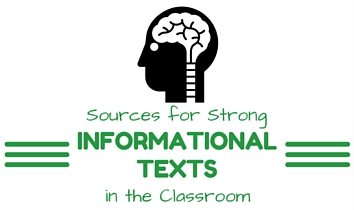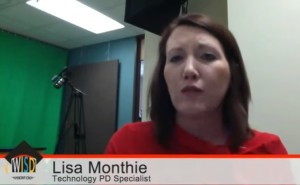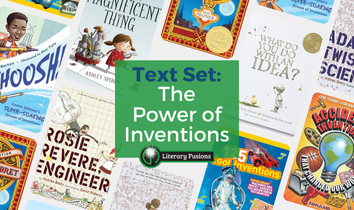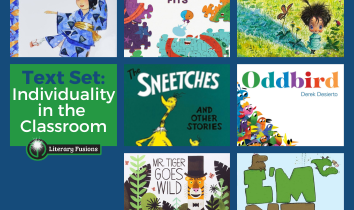 There is no denying that classrooms are beginning to use more and more nonfiction in the classroom. Current research has emphasized the importance of increasing nonfiction reading in the classroom and teachers are now on the hunt for strong texts. There are many places to find strong informational text for students that are engaging for them, yet rigorous enough to prepare students for anything that comes at them! While we are strong supporters of nonfiction picture books to engage students, there are also many places to find text on line.
There is no denying that classrooms are beginning to use more and more nonfiction in the classroom. Current research has emphasized the importance of increasing nonfiction reading in the classroom and teachers are now on the hunt for strong texts. There are many places to find strong informational text for students that are engaging for them, yet rigorous enough to prepare students for anything that comes at them! While we are strong supporters of nonfiction picture books to engage students, there are also many places to find text on line.
A word of caution and a plea: Many of these sites offer multiple choice questions at the end of their articles, but please think twice before just handing the questions to your students after they read. When there is too much “to do” after reading (questions to answer), the students’ only goal becomes to complete the task, when our main goal should be to engage them in current events and reading. We totally understand the need for grades and to assess the students’ comprehension of the article, but we propose that there are other ways to do so. Discussion is one of the most authentic ways to see what students know, but also to encourage them to think more critically about what they read. During a class discussion, students can glean a variety of different perspectives on a topic from their classmates, and they can develop a deeper understanding of the text. Encouraging students to write a reflection on an article directed towards what you are trying to assess (point of view? text structure? author’s purpose?) can also help you see what they know. If you absolutely must administer the questions, try having a good class discussion first. Give students a chance to engage as a true reader engages in conversation after reading and only then, after the true learning has taken place, provide the questions. Odds are that the students will ace them!
Here are a few of our favorite sites:
All Level:
- Tween Tribune. WOW has this site grown! About four years ago I found this site and it was basic, but the kids loved it. Now it is so much more! It’s split into K-4, 5-6, 7-8, and 9-12. There are also choices for Spanish, Tech, and Teachers. On the teachers page, there are links to lesson plans and resources. Another new change that teachers will love is that you can change the Lexile levels of the articles. For the articles you have four choices of Lexile level so you can differentiate in class! There are also quizzes, but the power will be in discussion and a writing reflection

- NewsELA. This one is a fan favorite! I like this site for quite a few reasons. Just like with Tween Tribune, you have about four Lexile levels for each article. In addition, the articles have multiple categories; art, science, people, etc. You can also choose articles by grade ranging from 2 – 12. Perhaps my favorite feature is the “text set.” This tab connects articles to famous novels! Do I hear secondary teachers’ hearts fluttering??
- Read Works. You do have to create an account to use this site, but it’s free. There are many ways to search for text on this site. You can search by genre (there’s more than just informational), grade, reading level, skill, and more! This site has literature units as well. Again, you don’t need the questions, promise!
Elementary:
- National Geographic for Kids. We all know how fabulous National Geographic is, so there should be no debate in how powerful their site for kids is. While you can become a member for extra features, your students will be able to access feature articles, beautiful photographs, and maps for free.
- Here, There, Everywhere. This is a great site for students. It is written and put together by Claudia David Heitler, a former employee from the Today show. The news articles are very short, but current. One of the kids’ favorite parts is that there are videos throughout the articles. (Okay, I like the videos as well!)
- Wonderopolis. My favorite! Not so much for teaching informational texts, but for higher level thinking, engaging students, and problem based learning. On this site, visitors as asked to write something they wonder about. (Yes, your class can contribute to this, too!) The wonders are voted on (you can vote too)! Then, the wonder is answered by the site’s authors with a medium length text. Students can read and then take a fun interactive quiz on the information.
- News-O-Matic. Please don’t forget about this gem. We reviewed this app in-depth here.
- DOGO News. This is a new site for us, but it looks amazing! Articles range from grades K through 8 and cover current events and news in various categories such as science, sports, entertainment, etc. Each article is relatively short, grade-level appropriate, and has engaging visuals. At the end of each article are comprehension questions, a critical thinking challenge, and some vocabulary from the article that you can either click on to get a definition, or use to play a quick game. So cool! The cherry on top of this great site is its ability to interface directly with your Google Classroom account – so you can post the articles and have students responding to the critical thinking questions or engaging in organic conversations online!
Secondary:
- Kelly Gallagher’s Article of the Week. Kelly Gallagher posts weekly current events for students. While the text will be a high level, it is important for students to read challenging text. Students will engage with the text if teachers scaffold the reading and engage students in conversation. At the end of each article, Gallagher posts a few reflection suggestions.
- Student News Daily. There aren’t necessarily a lot of bells and whistles on this page, but the articles are strong. At the end of each article there are questions for students to respond to, but again, you’ll be able to engage your students in conversation around these articles so you won’t need the questions. On the left side, there is a one click print button that will print the article clean (without sidebars). There’s also an app for this one!
- Vale Middle School Article of the Week. Vale Middle School has engaging articles posted weekly. The articles provide A LOT, maybe even too much! It’s good stuff, but just be warned that students might be a little overwhelmed by all that is on the page. Each article begins with quite a few reading strategies; different ways to mark the text, strategies to document in columns, and strategies to be successful in the text. The text is printed so that there are margins where kids can write their thinking. Those who know me know that this makes me very happy! At the end there are questions and writing prompts. Again, they are helpful, but overwhelming. I would possibly use this site, but take all the scaffolds except the ones you’re concentrating on.
- News Map. Admittedly, this is over stimulating to me, but most students would love this site. The news articles are set up in colorful blocks. Students simply click on one that strikes their fancy and can begin reading.
Click below to hear Lisa Monthie’s ideas for getting text.
What is your favorite site for informational text?







How do you have a meaningful class discussion over these articles?
There are many ways to conduct meaningful conversations in your classroom and I don’t think one way is necessarily better than another. How you choose to conduct discussion is dependent upon your teaching style and students in your class. However, recently I worked in a third grade class and had a nonfiction article about roller coasters. Instead of just reading it and moving on to comprehension questions, I stopped every so often and modeled reading strategies (monitoring comprehension, asking questions, and making connections). This of course, got the students wanting to share their questions and connections. I encouraged them to join in the conversation and soon we were all immersed in a conversation about roller coasters, even using the internet to look up ideas and questions along the way. Even though I follow a similar pattern in secondary classrooms as well, you can also raise the level of conversation by providing an essential question. I like my essential questions to be open ended, not text dependent, and higher level thinking. We add some of our essential questions around theme in our blog posts about novels.
Thank you Jessica,
As a new teacher I greatly appreciate all your hard work. You have done all the hard work for me. This year will be my best year yet, and it’s because of people like you. Thank you again.
You’re welcome. We hope you have a fabulous year!
Thank you for the plethora of resources to find quality informational text that can be integrated into a balanced literacy classroom. Your blog is easy to read and has a knack for seeing it truly through the eyes of a teacher.
You’re welcome, Wendy! We are happy to help and love hearing that it is helpful!
Have a great year.